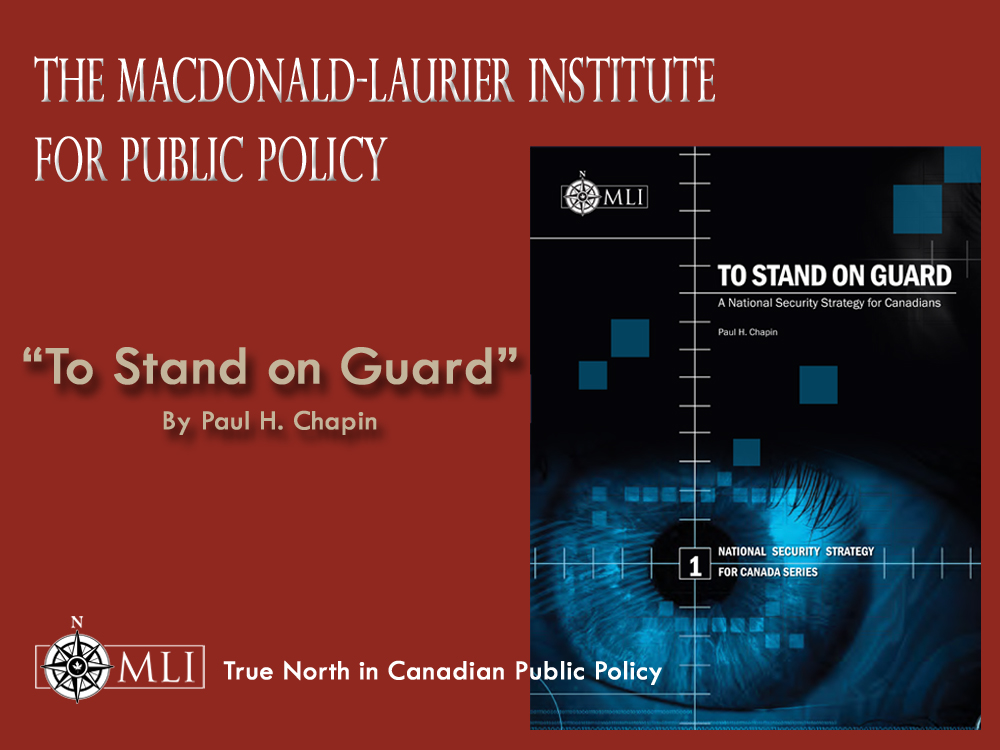
To Stand on Guard, by Paul H. Chapin.
November 2010
Paul Chapin on CFRA’s Madely in the Morning, November 29.
Canada in dire need of security strategy, says former diplomat, Toronto Star, November 29.
Canada lacks anti-terror master plan, expert says, Victoria Sun, November 29.
Canada needs a national security strategy: Report, iPolitics, November 30, 2010
EXECUTIVE SUMMARY (version française)
Values, Threats and Strategies
Canadians cannot take their security for granted, comfortably convinced that trouble in distant time zones matters little to us. We need a national security strategy, one that specifies our core national values and interests, identifies the main dangers to them, and outlines suitable remedies that are strategic in nature, discriminate between what is important and what is less so, and take account of our particular circumstances.
Values
The values that distinguish life in Canada are individual freedom, democracy, the rule of law, social justice, and economic opportunity. Preserving such a way of life is the supreme national interest of Canada.
Threats
Danger can assume many forms. But the three most important kinds are physical attack or coercion, internal subversion, and erosion of the beliefs and practices that give a state its special character.
The end of the Cold War raised hopes that peace would prevail. But 9/11 provided a jolt of reality and launched a new age of security planning. The world is still plagued by disputes between states, civil wars and insurrections, an underground market in arms including weapons of mass destruction, and rogue states. The really bad news is that there is a new world war under way, still mostly low-intensity, pitting radical Islamists against Muslim governments in the Middle East and Asia and against democratic societies everywhere.
The main foreseeable threats are unbridled extremism, uncontrolled immigration, and friction due to resource scarcity. Motives will vary, but the methods will combine traditional and irregular warfare to target people and prosperity. The technology of advanced states will be turned against them, and adversaries will use physical and psychological means to try to convince people to reject the democratic way of life.
Strategies
Canada’s national security strategy must combine a home game and an away game. And it must be driven by consideration of the key values our foreign and defence policy must protect, the key threats to those values, and the key measures necessary to defeat those threats. The program should aim to:
- Reduce Canadian vulnerabilities by protecting the community at large in conditions between war and peace with antiterrorist legislation for the long term; protecting immigrant communities susceptible to intimidation or recruitment by militants; better calibrating the flow of new arrivals to Canada; exercising greater control over entry to the country; fixing our dysfunctional refugee determination system; convincing the courts to show greater deference toward the security and intelligence services; and protecting Canada’s complex and interconnected critical infrastructure.
- Create layered defences against threats to national security through enhancing Canada’s capacity to know what is happening on its land mass and in its coastal waters; working toward a common security perimeter with the United States; rationalizing the North American defence architecture; participating in ballistic missile defence; and establishing a Canadian foreign intelligence service.
- Take action against threats through diplomatic activity on international issues that jeopardize international peace and security; devoting a much higher portion of our development assistance budget to improving conditions in states on the frontline of the war on terrorism and in failed states that are incubating the security problems of the future; marshalling sufficient resources to frustrate terrorist activities and disrupt the clandestine arms market; and sustaining and enhancing the capacity of the Canadian Forces to deploy and maintain forces virtually anywhere in the world they might be needed.
- Address the factors that nourish security threats by working with Muslim communities to undermine support for radicals and with other democratic states to disrupt and defeat terrorist networks; and targeting development assistance to alleviate poverty in countries prone to nurturing terrorism.
- Modernize the international security architecture through more effective maintenance of international peace and security; enhancing the role of NATO and regional organizations; and developing new rules of international law to govern the actions of states in the war against terror — in particular, on intervention and the treatment of terrorist prisoners.






